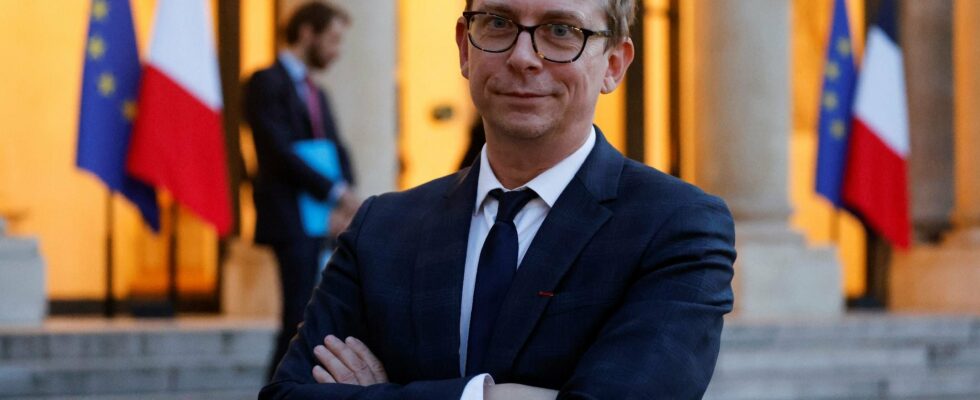“Runoff” is an interesting scientific concept, although capricious. He would like the accumulation of wealth to end up benefiting as many people as possible. This is only rarely the case. Gérald Bronner is well placed to know: he is a sociologist, a science that keeps studying these questions. This does not prevent him from believing it: “Our runoff will be made, no choice,” he assures the platform this Tuesday. Above him, we can read: “Pacem Summa holding”. “Green things, elevation through knowledge, support peace”.
The adage, engraved on the walls of amphitheater Richelieu at the University of the Sorbonne in Paris, suits him so well: in front of 500 people, the academic – also a columnist at L’Express – launched this day “develop his Critical spirit “, a series of conferences on disinformation. Free and broadcast online, the seminar aims to cause an impetus, a collective “start”. “Drawing”, in short, “the critical spirit”, its object of study, so as to counter Fake News, interference, and manipulations.
You have to recognize a good start. Its four sessions, all spaced one month old, are complete. For his first, he harangues, amuses, calls to take the “weapons” – mental only. The scientist, who is said to be liberal, believes deeply in the powers of “the individual”, of the very brain, in the face of the dangers of false information. Evidenced by his books, The democracy of the gullibleor even the bestseller Cognitive Apocalypse. It would be enough, to hear it, to educate consciences so that rationality regains debates.
“The credulity has good VRPs”
His seminar testifies to his commitment to the facts. But especially do not tell him that his sociology is a “combat sport”. The author has always preferred Raymond Boudon to Pierre Bourdieu, the father of this expression. Like the first, he is interested in individual choices rather than system effects. He sees his field of study as an “engineering” rather than a activism. His proposal, at the platform, nevertheless looks like a beginning of movement: “I would like you to transmit what I will tell you, to your loved ones, your family, your colleagues. Without giving lessons, Without saying what to think, without making fun, because everyone can be sensitive to untruths. “
He enters, a good speaker: “The credulity has very good VRP, but we will not let them do”. The public is easy. Senior executives, largely. “Maybe not those who need that most!” He admits. The knowledge he would like to see – how digital “liberalizes” the information market, and how behavioral techniques help resist – has already splashed its listeners. “We still know how to sort through”, blows a lady, her down jacket on her knees, former research engineer. “It’s no longer to feed the conversations you go. And then it’s beautiful, the Sorbonne,” adds a former doctor.
“You have to start somewhere,” retorts Gérald Bronner. The format he chose recalls the intellectual self -defense courses that have spread since May 1968. Except that here, the atmosphere is felted, and the threat is not state propaganda or “dominant” classes But the “superspreader”, these bad influencers and the algorithms that encourage them. “1 % of existing profiles on social networks produces 30 % of the information that is exchanged there. And the most active are always the most radical,” he recalls, citing Reference studies on the dissemination of online messagesall published in the late 2010s.
“A declaration of mental independence”
On stage, Gérald Bronner does not designate enemy – it is not his type – or political measures – it’s already done. In 2021, President Emmanuel Macron entrusted him with a Commission on the subject. With a cenacle of experts, he recommended to engage “the civil liability of the bad faith diffuser of a false detrimental news”, to strengthen media education and required greater transparency of the platforms. Proposals listened to, for the most part, but which did not prevent distrust and attraction for alternative theories.
Tonight, the sociologist prefers to defend a pact. He made his audience promise to take a step back, to think against himself, in a sort of “declaration of mental independence”, a social contract of Jean-Jacques Rousseau. And distills small “stuff” to thwart cognitive biases, recognize them. The first session relates to a reminder: correlation is not causality. Behind him is a photo of duck. In the background, a metallic barrier several meters high, smashed. “We suspect that it is not the animal that caused so much damage,” he laughs.
The room, acquired in its cause, laughs at its jokes. It stretches when it evokes the “civilizational risk” posed by the crisis. News obliges, he speaks at length about the return of Donald Trump to power to the United States, and his lies. The sociologist would ultimately like to launch real popular universities, “that we are several to speak, with associations”. He dreams that little by little democratizes the kinds of “Tupperware meetings of rationality”. Let all, at least those who want it, be able to decompose information, and analyze it, to avoid the traps.
Why not start elsewhere than in one of the best French universities, where quality information is already abundant? “I give a lot of conferences you know,” he reminds us. It is true, Gérald Bronner scums the rooms all over the world, and not only the amphitheatres. One day at the SNCF, and the next day, at the Court of Auditors. Which even forces him to do “recovery”: some slid From his slideshow has not changed in three years. His show is filmed, for a documentary. At the end, a screenwriter is approaching. He tells him that he wants to put a show on the subject of disinformation, and asks what a sociologist’s work he should read. The start of runoff?
